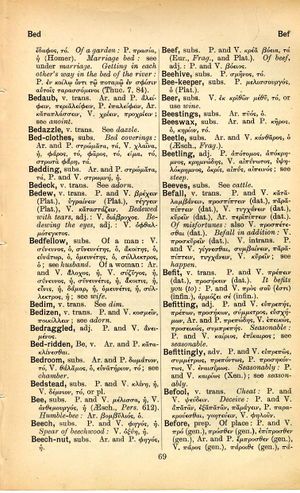bee: Difference between revisions
From LSJ
ἄμμες δὲ γ' ἐσσόμεσθα πολλῷ κάρρονες → and we shall be better by far | we shall be sometime mightier men by far than both | sometime we shall become much better than you | so we shall be, and braver far
(Gf-D_1) |
(3_2) |
||
| Line 12: | Line 12: | ||
{{Gaffiot | {{Gaffiot | ||
|gf=<b>bee</b>, ind., onomatopée reproduisant le bêlement des moutons : [[Varro]] R. 2, 1, 7. | |gf=<b>bee</b>, ind., onomatopée reproduisant le bêlement des moutons : [[Varro]] R. 2, 1, 7. | ||
}} | |||
{{Georges | |||
|georg=bee, griech. βη, Naturlaut der Schafe, Varr. r. r. 2, 1, 7. | |||
}} | }} | ||
Revision as of 08:29, 15 August 2017
English > Greek (Woodhouse)
subs.
P. and V. μέλισσα, ἡ, V. ἀνθεμουργός, ἡ (Aesch.. Pers. 612).
Humble-bee: Ar. βομβυλιός, ὁ.
Latin > English (Lewis & Short)
bee:
I the sound made by a sheep, Varr. R. R. 2, 1, 7; cf. balo.
Latin > French (Gaffiot 2016)
bee, ind., onomatopée reproduisant le bêlement des moutons : Varro R. 2, 1, 7.
Latin > German (Georges)
bee, griech. βη, Naturlaut der Schafe, Varr. r. r. 2, 1, 7.

